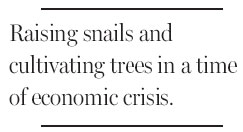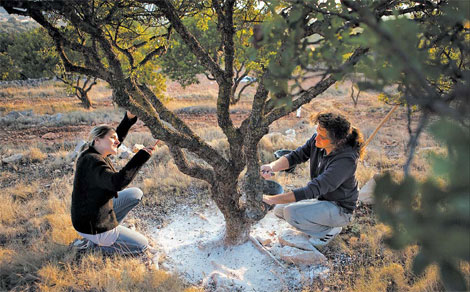Greeks Go Back to the Land
Updated: 2012-01-15 08:08
By Rachel Donadio(The New York Times)
|
|||||||||
|
Agriculture is one sector where there is job growth amid rampant unemployment in Greece. Vassilis Ballas and his wife, Roula Boura, extracted gum from a mastic tree on their farm in Chios. Eirini Vourloumis for The New York Times |
CHIOS, Greece - Nikos Gavalas and Alexandra Tricha, both 31 and trained as agriculturalists, were frustrated working on poorly paying, shortterm contracts in Athens, where jobs are scarce and the cost of living is high. So last year, they decided to start a new project: growing edible snails.
As Greece's blighted economy plunges, the couple are joining an exodus of Greeks who are fleeing to the countryside and looking to the nation's rich rural past as a guide to the future. They acknowledge that it is a peculiar undertaking, with more manual labor than they, as college graduates, ever imagined doing. But in a country starved by austerity even as it teeters on the brink of default, it seemed as good a gamble as any.
Mr. Gavalas and Ms. Tricha moved back to his native Chios. They set up their boutique farm using $50,000 from their families' life savings. That investment has yet to pay off; they will have their first harvest later this year. But the couple are confident.
"When I call my friends and relatives in Athens, they tell me there's no hope, everything is going from bad to worse," Ms. Tricha said recently, as she walked through her greenhouse, where thousands of snails lumbered along on rows of damp boards. "So I think our choice was good."
Unemployment in Greece is 18 percent, rising to 35 percent for young people between the ages of 15 and 29 - up from 12 percent and 24 percent, respectively, in late 2010. But the agriculture has been one of the few sectors to show gains since the crisis hit, adding 32,000 jobs between 2008 and 2010 - most of them taken by Greeks, not migrant workers, according to a study released this fall by the Pan-Hellenic Confederation of Agricultural Associations.
"The biggest increase is in middle-aged people between 45 and 65 years old," said Yannis Tsiforos, the director of the confederation. "This shows us that they had a different sort of employment in the past."
In Greece, as elsewhere in the Mediterranean, most families have traditionally invested heavily in real estate and land, which are seen as far more stable than financial investments, and it is common for even low-income Greeks to have inherited family property.
Enrollment in agricultural schools is also on the rise. Panos Kanellis, the president of the American Farm School in Salonika, which was founded in 1904 and offers kindergarten through high school as well as continuing education in sustainable agriculture, said applications tripled in the past two years and enrollment in classes like cheesemaking and winemaking has been rising.

Mr. Kanellis says that young people have been coming frequently to him to say: "I have two acres from my grandfather in such-and-such a place. Can I do something with it?"
A growing number of Greeks are asking themselves that question, and some are deciding they can. "In big cities, there's no future for them," Ms. Tricha said. "For young people, the only choice is for them to go to the countryside or to go abroad."
In 2006, Vassilis Ballas and his wife, Roula Boura, both 36, left their jobs in Athens, where he worked in content management at a Web site and she in marketing, to move to the Aegean Island of Chios, where his grandparents were from. They decided to try their luck cultivating mastic trees, which grow only in southern Chios and produce an anise-like resin that is harvested and crystallized to produce mastic liquor, foodstuffs, candles and soap.
"We were thinking of moving out of Athens, and a friend told us, 'My grandmother produces 100 kilos of mastic going out on her own with a donkey,'" Mr. Ballas recalled, a crop for which a producer can earn around $18 a kilogram wholesale. But the couple found that mastic cultivation was much more difficult than they supposed and have added mastic-related ecotourism.
Some young Greeks are returning not to the land but to the sea, joining another venerable Greek industry. Since 2008, the number of applications to maritime schools across Greece has quadrupled to nearly 7,000, according to the Naval Ministry.
Yannis Menis, 27, a Chios native, said he had a promising career ahead of him as a nuclear physicist. But just shy of his Ph.D., he could not afford to continue his studies and decided to follow in his father's footsteps as a ship engineer.
Mr. Menis started maritime school in Chios in September. "My family opposed my wish to enroll; they were asking me, 'Did you study all those years for nothing?'" he said. "I didn't tell anyone on board about my scientific past. Everywhere in Greece it's a disadvantage to be overqualified now."
The impulse to return to Greece's rural roots itself represents a telling new tendency since the onset of the crisis - a turning inward, a quiet kind of national pride in response to the overall gloom. Dimitris Kaloupis, who left his job as a construction worker 20 years ago during the boom years and now is a full-time farmer in Volissos, raises his own animals and vegetables and runs a local tavern. He said he thought Greece could handle this crisis, as it had many others.
"We invented civilization, and we'll take it back," Mr. Kaloupis said over a lunch of stewed lamb that he raised himself. If the Greek economy really plummets beyond repair, "I will take the rock in my hand and squeeze it, and from the water that comes out of it, I'll make pilaf to feed my daughter. We'll manage."
Dimitris Bounias contributed reporting.
The New York Times
(China Daily 01/15/2012 page9)
